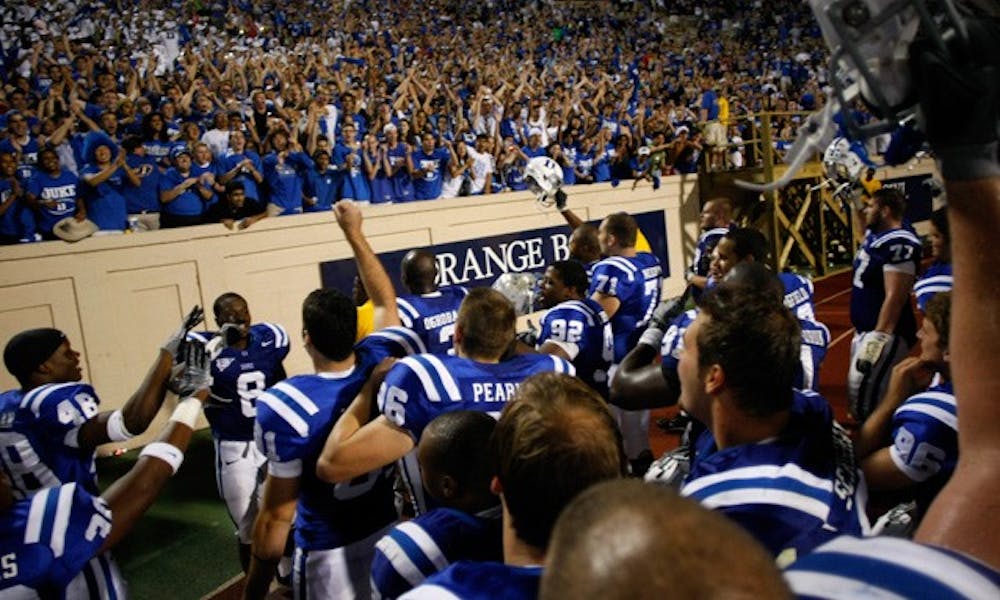Every day, it gets a little harder to believe. Duke won a national championship, and I was there. I was on the court two minutes after Gordon Hayward missed that shot that no Duke fan will ever forget. As the players celebrated, I told Brian Zoubek that I was a Duke senior and asked him what this title was like for him, and as he answered, he put his arm around my shoulders and hunched down—really, he could have sat down, since he’s 17 inches taller than me—and we chummed it up as if we were just a pair of Duke students. And the day the Blue Devils beat West Virginia, two hours before the Michigan-State-Butler game, I sat on Coach K’s stool. Yes, it’s as cool as you think.
And all along—as Duke breezed through Jacksonville, Houston, and eventually, Indianapolis, too—I had to keep asking myself: Is it worth it?
Because for every other Duke fan aside from the players, the coaching staff and their massive entourage, this Blue Devil run to the Final Four was a dream come true. But for me, the sports editor of The Chronicle, it meant a hell of a lot more work than I had signed up for, just as my college days were coming to a close.
In the end, it probably was worth it. The newspaper on the day of April 6—the one with the wonderful photo of Jon Scheyer hugging Lance Thomas, with the bolded headline, UN-FOUR-GETTABLE—was a beauty, and it featured my story prominently. My name is on t-shirts, for God’s sake. Writing that story was an honor, and I value that more than having attended the game itself.
That’s the problem with sportswriting, if you do it for long enough: The spectacle you’re going to see—and the Final Four really is a spectacle, and you couldn’t have asked for better seats than the ones I was watching from—loses some of its luster, because you have to think about what comes after, whether it’s a story, a blog post or an entire newspaper. You can’t focus on the amazing skill you’re seeing just feet in front of you. Instead, you have to focus on the words players and coaches mumble in the press room, where neither party really wants to be, or in the locker room, a place where short, white, Jewish journalists like myself don’t belong.
And it’s a shame, because as Alex Fanaroff wrote in his pseudo-farewell column last week, athletics let you see life in a special way. Sports have always allowed me to feel like part of the team—to pretend I could sink that jump shot, make that throw or chip that soccer ball into the top-right corner of the goal—and being at a school with such a great athletic program has accentuated that feeling. I gleefully chanted “BCS! BCS!” after Duke, in Coach Cutcliffe’s first game, beat James Madison at Wally Wade. I jumped up and down on the Koskinen Stadium bleachers during a men’s soccer game against Carolina my freshman year, before basketball season even started, as Duke held onto a one-goal lead with 10 men. I waited out two injury timeouts, a rain delay and a change of venue to watch Reid Carleton’s incredible comeback against UNC on the tennis court. I’ve yelled unconscionable things at visiting basketball players. And as anyone who knows me well would tell you, I’ve proudly worn green and orange twice into Wallace Wade Stadium and rooted for my team—Miami, not Duke—and I can’t wait to do it again. That’s what sports are about: a feeling of real connection with something bigger than you. There’s nothing contrived about it, at least not at the college level.
Journalism—not sports journalism, but the process of reporting a meaningful story with a measurable impact—has allowed me to feel something similar. Becoming a journalist has been the defining aspect of my college experience, and it has given me the chance to meet some of the most fascinating and insightful people on this campus, particularly the dearly departed Susan Tifft. For me, journalism was the door that had been cracked open since the moment I moved into Bell Tower four years ago, and now, four years later, that door is all the way open. I know this University more deeply than I never thought I would, and I’m not just talking about the Department of Athletics.
Get The Chronicle straight to your inbox
Sign up for our weekly newsletter. Cancel at any time.
I’ve also been challenged intellectually as a member of The Chronicle as much as or more than I ever was in a Duke classroom, and that’s why I was so willing to trudge up the three flights of stairs to 301 Flowers hundreds, maybe thousands of times since August. I did more than my fair share of grunt work, yet much of the time, being a part of the journalistic process was a thrill, and the freedom I had to mold the sports section as I saw fit meant a lot to me.
But at this point, with literally days remaining in what I consider my childhood, I’m done. I can’t do it anymore. I’ve given The Chronicle countless precious hours of my senior year—too many, if you ask my friends, girlfriend or parents—and with this column, I signal the end of my brief, shooting-star-like career as a sports journalist. I only wish I had been able to retire at my absolute apex, which truly was un-four-gettable.
The chance I had to write that national championship story—an opportunity only three other people in the 105-year history of The Chronicle have had—is one I will always be grateful for. And while I’ve fallen out of love with sportswriting, I won’t ever fall out of love with sports. The World Cup, football season and Duke Basketball’s national championship defense are right around the corner, and I’ll be watching every step of the way.

